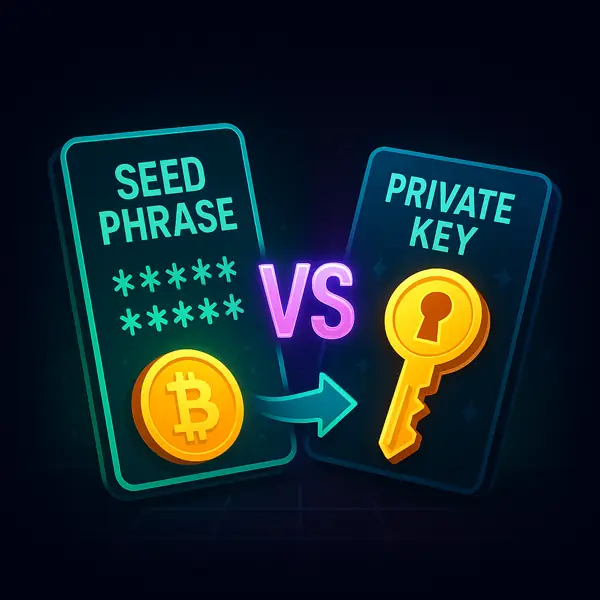Every crypto wallet talks about seed phrases and private keys. Lose them, and your money is gone. Share them, and someone else can empty your wallet in seconds.
But what’s the difference between the two? And why do they matter so much for your crypto security?
Let’s break it down clearly so you’ll never get confused again — and avoid the rookie mistakes that have cost beginners billions in lost funds.
What Is a Private Key?
A private key is like the password to your specific wallet address. It’s a long string of letters and numbers that proves you own the funds in that address.
Example: 5J3mBbAH58CERf... (Bitcoin private key)
- Every wallet address has its own private key.
- Whoever controls the private key controls the funds.
- If someone hacks or steals your private key, they can spend your crypto instantly.
In practice, you rarely see private keys directly, because wallets hide them behind seed phrases. But they’re always there in the background.
What Is a Seed Phrase?
A seed phrase (also called a recovery phrase or mnemonic phrase) is a list of 12 or 24 words that acts like a master backup of your wallet.
Example: apple tiger desk moon rocket ocean guitar...
- Your wallet uses the seed phrase to generate all your private keys.
- With just the seed phrase, you can restore your wallet on any device.
- If you lose your device, you can still recover your funds with the seed phrase.
Think of it this way:
- Private key = single door key
- Seed phrase = master key that unlocks every door in your wallet
Why Do Both Exist?
Private keys come first. They’re essential for signing transactions. But since managing dozens of random keys would be impossible for humans, wallets use seed phrases as a human-readable backup.
So instead of writing down 50 different private keys for 50 different addresses, you just keep one seed phrase, and it can regenerate them all.
Custody, Keys, and Why It Matters
This is why the phrase “not your keys, not your coins” is everywhere in crypto.
- Custodial wallets → You never see private keys or seed phrases. The exchange manages them for you.
- Non-custodial wallets → You get a seed phrase during setup. That’s your ultimate control.
If a wallet doesn’t give you a seed phrase, you don’t really own the funds. You’re trusting someone else.
Common Mistakes Beginners Make
- Storing seed phrases online
Screenshots, Google Drive, email drafts — hackers love these. Always write it down on paper or use a metal backup. - Sharing seed phrases with scammers
No legit support team will ever ask for it. If someone does, it’s a scam. Period. - Confusing passwords with seed phrases
Your MetaMask password just unlocks the app. The seed phrase is the real wallet backup. - Losing paper backups
Fire, water, or simply forgetting where you put it — many people lost fortunes this way. - Typing seed phrases into random websites
Fake airdrop sites or “connect wallet” scams often trick beginners into entering phrases. That’s instant wallet drain.
Real-World Horror Stories
- $4B in Bitcoin lost forever → Chainalysis estimates that millions of BTC are gone because people lost private keys or seed phrases.
- Ledger users → Some stored seed phrases online, got phished, and saw life savings vanish.
- MetaMask scams → Countless Telegram groups push fake “recovery” forms asking for your seed phrase. One copy-paste mistake = total loss.
These aren’t rare accidents. They happen every day.
Tips to Keep Seed Phrases Safe
- Write it down on paper or engrave on metal.
- Store copies in two or three safe places (don’t put all your trust in one slip of paper).
- Never take photos or store it digitally.
- Test recovery on a spare wallet before moving large funds.
- Teach trusted family (if you want inheritance) how to access it safely.
Private Key Management Tips
Most beginners never need to touch private keys directly. But if you do:
- Never copy-paste keys in plain text.
- Use secure storage (encrypted password managers, if absolutely necessary).
- Prefer seed phrases → they’re safer and more practical.
Numbers That Show the Risk
- Around 20% of all Bitcoin is estimated to be lost forever due to forgotten keys and phrases. That’s more than $150 billion at current prices.
- In 2023, phishing scams targeting seed phrases stole hundreds of millions across Ethereum and BNB Chain.
- Ledger, Trezor, and other cold wallet makers now promote metal seed backups as the only reliable long-term option.
Final Word
The difference between a seed phrase and a private key is simple but critical:
- Private key = the password to a single address
- Seed phrase = the master backup that controls everything
Lose either, and your funds are gone. Share either, and you’re wrecked instantly.
As a beginner, you’ll mostly deal with seed phrases, since wallets handle the private keys under the hood. But never forget: your seed phrase is your ultimate crypto lifeline.
If you treat it like treasure — storing it offline, never sharing it, and backing it up properly — you’ll avoid the mistakes that have cost degens billions.
In Web3, security starts with your keys. Protect them like your life depends on it.
Wagmi 🚀


